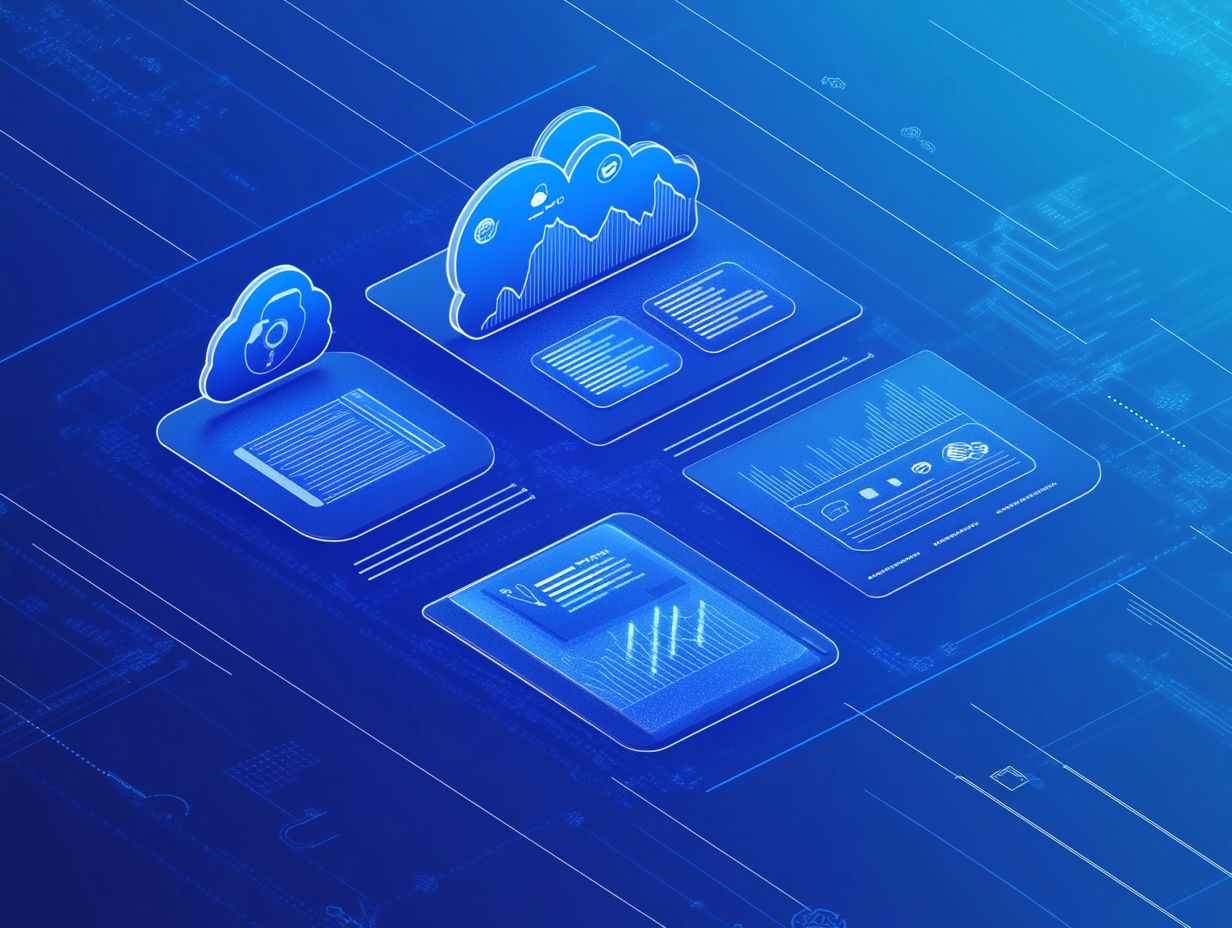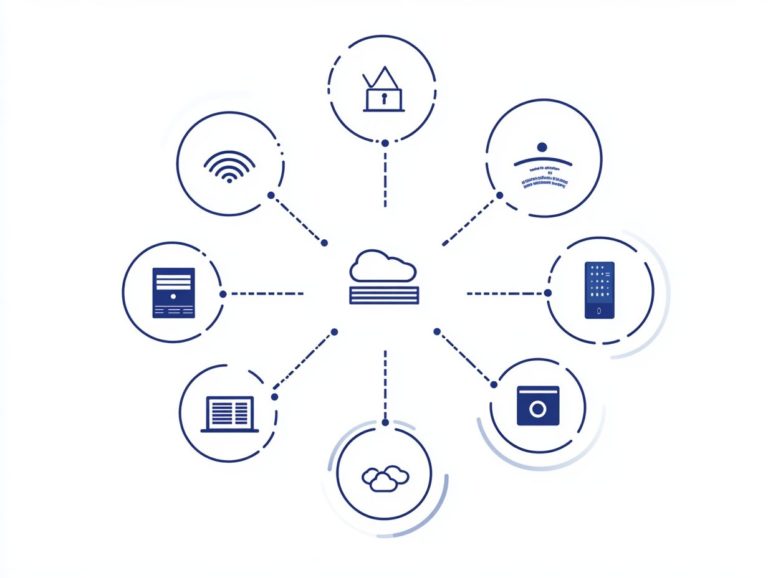5 Features That Differentiate Cloud Providers
Choosing the right cloud provider is essential for any business navigating today s digital landscape. With numerous options at your fingertips, understanding what distinguishes each provider can significantly impact your operations.
This article delves into five key features flexible pricing, scalability, reliability, security, and customer support that can shape your decision-making process.
It also helps you identify your specific needs, address common concerns, and anticipate future trends in cloud computing, helping you stay ahead of the curve.
Dive in and discover how to make the best choice today!
Contents
- Key Takeaways:
- 1. Flexible Pricing Options
- 2. Scalability and Resource Allocation
- 3. Availability and Reliability
- 4. Security and Compliance
- 5. Support and Customer Service
- What Are the Key Factors to Consider When Choosing a Cloud Provider?
- What Are the Different Types of Cloud Providers?
- How Can a Business Determine Their Specific Needs for a Cloud Provider?
- What Are the Common Concerns and Risks with Cloud Providers?
- How Can a Business Ensure Data Protection and Privacy with a Cloud Provider?
- What Are the Future Trends in Cloud Computing and How Can a Business Stay Ahead?
- Frequently Asked Questions
- What are the 5 features that differentiate cloud providers?
- How does scalability differ among cloud providers?
- What are the various security measures offered by cloud providers?
- What are the different pricing models offered by cloud providers?
- How do deployment options differ among cloud providers?
- How important is customer support in choosing a cloud provider?
Key Takeaways:

- Flexible pricing options allow businesses to choose a cloud provider that fits their budget and needs.
- Scalability and resource allocation ensure that businesses can easily adjust their cloud usage as their needs change.
- Availability and reliability are crucial for uninterrupted access to important data and services.
1. Flexible Pricing Options
Flexible pricing options form the bedrock of cloud computing, giving you the chance to use services from leading providers like AWS, Microsoft Azure, and Google Cloud. With pay-per-use pricing models, you can optimize costs while enhancing resource allocation.
These pricing strategies allow you to scale your computing resources according to changes in demand, ensuring you pay only for what you actually use. For instance, during peak seasons, a retail company could ramp up its computational resources to manage a surge in traffic and then reduce them during quieter times.
This flexibility helps you manage your budget better, keeping costs predictable and aligned with your service usage.
Resource pooling allows multiple users to share the same infrastructure, promoting higher utilization rates and ultimately driving down costs. By leveraging these pricing models, you can maximize efficiency and channel your savings into other strategic initiatives, fostering a more agile and responsive operational environment.
2. Scalability and Resource Allocation
Scalability and resource allocation in cloud computing, especially through platforms like AWS, Microsoft Azure, and Google Cloud, allow you to manage workloads with remarkable efficiency.
With rapid elasticity and virtual machines tailored to your business needs, you can adapt to changes effortlessly. This flexibility means you can swiftly adjust your resources in response to fluctuating usage patterns, maintaining optimal performance while keeping costs in check.
AWS, for instance, offers features like Auto Scaling, which automatically adjusts the number of EC2 instances based on traffic. Meanwhile, Microsoft Azure s Virtual Scale Sets enable you to manage thousands of identical virtual machines with ease. Google Cloud’s instance groups provide similar capabilities, allowing you to create scalable and reliable applications.
By leveraging these tools, you can optimize resource allocation, ensuring you only pay for what you actually use, maximizing both your productivity and budget efficiency.
3. Availability and Reliability
In the realm of cloud computing, availability and reliability take center stage. Services like AWS Lambda, AWS Nitro System, and Amazon EC2 are designed to ensure resiliency and uptime essential elements for your business continuity and operational efficiency.
For you and your organization, constant access to applications and data is critical. When systems experience downtime, even for a fleeting moment, the repercussions can resonate throughout your entire organization, resulting in financial losses and eroded customer trust.
AWS Lambda, with its scalable and serverless computing capabilities, automatically adjusts resources according to demand, boosting your overall reliability. On the other hand, Amazon EC2 offers flexible virtual computing capacity that adapts to varying workloads.
These solutions work in harmony to provide uninterrupted service and enable your organization to achieve its operational goals, strengthening your competitive edge in an ever-evolving digital landscape.
4. Security and Compliance

Security and compliance in cloud computing are crucial. You need to navigate a system where both you and the cloud provider share security duties. It’s essential to ensure data residency and utilize robust solutions from third-party providers to protect sensitive information and uphold cybersecurity standards.
Understanding this model is important because it outlines the responsibilities of both the cloud service provider and your organization. Ensure compliance with local regulations that specify where data can be stored and processed. This is critical in sectors like healthcare and finance, where handling sensitive data is routine.
Employing third-party solutions not only strengthens your security measures but also provides access to specialized expertise. Using these external resources helps enhance your overall cybersecurity posture and effectively reduce the risks of data breaches.
5. Support and Customer Service
Effective support and customer service are vital in cloud computing. You rely on cloud providers for responsive assistance and automation software to streamline troubleshooting and improve your user experience.
In today s fast-paced digital landscape, cloud service providers offer various support levels, from basic help desk assistance to dedicated account management and specialized technical support teams. This tiered approach ensures you can access the right level of help tailored to your specific needs and the complexities of your cloud applications.
Great customer service can transform the way you manage your cloud resources! Automation software plays a critical role, enabling prompt issue resolution so that your teams can focus on strategic initiatives instead of getting bogged down in the details.
What Are the Key Factors to Consider When Choosing a Cloud Provider?
Don’t overlook these key factors when choosing a cloud provider! Carefully consider what features to look for in a cloud provider, such as security, pricing model, scalability, and operational efficiency to ensure the service aligns with your specific business needs and strategic objectives.
Security remains a top priority; make sure your provider has robust measures to protect sensitive data.
Pricing models can significantly impact your budgeting strategies. Some providers offer flexibility with pay-as-you-go options, beneficial for smaller enterprises or startups.
Scalability is essential for accommodating growth; a provider that can easily increase services without significant downtime helps maintain your operational efficiency. Assessing compatibility with your existing business processes can enhance your overall strategy.
Consider giants like AWS and Azure, which provide extensive services tailored to various organizational needs. Understanding the key factors influencing cloud provider choices can help make your transition smoother and more aligned with your long-term vision.
What Are the Different Types of Cloud Providers?
Cloud providers come in various types, including public, private, and hybrid models, each designed to meet different business needs based on specific cloud deployment strategies. Understanding the 5 must-have features in cloud storage can help you make an informed choice.
Public clouds, like those from Amazon Web Services and Microsoft Azure, offer scalable resources over the internet. They are ideal for startups and organizations with fluctuating workloads due to their cost-effectiveness.
In contrast, private clouds provide dedicated infrastructure, typically housed within your own data center. This model is ideal for businesses that require strict data control and compliance, such as financial institutions.
Hybrid clouds combine these two approaches, allowing you to mix on-premise and cloud resources. This setup is particularly advantageous for enterprises needing the flexibility to manage varied workloads efficiently, such as those in healthcare or retail.
Ultimately, each model is tailored to meet unique organizational goals, whether you re focused on cost efficiency, data security, or flexible resource management.
How Can a Business Determine Their Specific Needs for a Cloud Provider?

To find the right cloud provider, first evaluate your current systems. Consider the applications you use and how they align with your business goals. Following the 5 steps to evaluate cloud providers’ performance can help you make an informed decision.
Start with an audit of your existing systems. This helps you spot weaknesses and areas for improvement. Group your applications, like customer management or e-commerce. This will clarify which features are essential for your operations.
Also, assess how easily your applications can grow with your business. Check the reliability and security measures of potential data centers to protect your sensitive information.
What Are the Common Concerns and Risks with Cloud Providers?
When choosing cloud providers, you’ll face risks like security issues and reliance on third-party vendors. It’s important to evaluate these factors and consider the 5 key features of modern IaaS solutions before moving to the cloud.
As you shift sensitive data to the cloud, protecting it from unauthorized access is critical. Relying on external vendors can expose your organization to risks, such as limited insight into their security practices.
Data residency is a challenge when you have to follow local laws about data storage. This can complicate global collaboration, so assess your cloud partnerships carefully.
How Can a Business Ensure Data Protection and Privacy with a Cloud Provider?
To ensure data protection with a cloud provider, implement strong security measures. Understand the shared-responsibility model, where both you and the provider play roles in data safety.
While cloud providers manage infrastructure security, you are responsible for data integrity. Establish clear protocols to safeguard sensitive information.
Stay informed about compliance regulations like GDPR and HIPAA, which govern how you handle and store data.
Engage your employees with training and regularly audit your security practices to build a culture of data privacy.
What Are the Future Trends in Cloud Computing and How Can a Business Stay Ahead?
Future trends in cloud computing, like the rise of AI, offer exciting opportunities for innovation. Stay competitive by integrating these technologies into your cloud platforms.
Using AI can streamline resource allocation and enhance decision-making. These innovations boost efficiency and automate routine tasks, freeing your team for strategic work.
To keep up with these changes, invest in ongoing training for your staff and find partners who use AI technology. Look for flexible cloud solutions that can adapt to new demands.
By adopting these strategies, you can harness the power of cloud advancements and lead your industry.
Frequently Asked Questions

What are the 5 features that differentiate cloud providers?
Cloud providers stand out based on five key features: scalability, security, pricing models, deployment options, and customer support.
How does scalability differ among cloud providers?
Scalability is a cloud provider’s ability to adjust resources as needed. Some providers offer auto-scaling, which automatically adjusts resources, while others require manual changes.
What are the various security measures offered by cloud providers?
Cloud providers implement various security measures, including data encryption and access control. To further enhance security, consider 5 tips for evaluating cloud service providers that also offer features like intrusion detection.
What are the different pricing models offered by cloud providers?
Pricing models vary among cloud providers. Common options include pay-per-use, subscription, and spot pricing. Understanding these can help you choose the best and most affordable option for your business.
How do deployment options differ among cloud providers?
Deployment options define how users set up and access cloud services. Options include public, private, hybrid, and community clouds. Some providers specialize in one type while others offer multiple choices, which can be compared in the cloud provider features guide.
How important is customer support in choosing a cloud provider?
Customer support is vital for smooth operations. Reliable providers often offer 24/7 support, while others may limit hours. Evaluate customer support options before making your decision.





